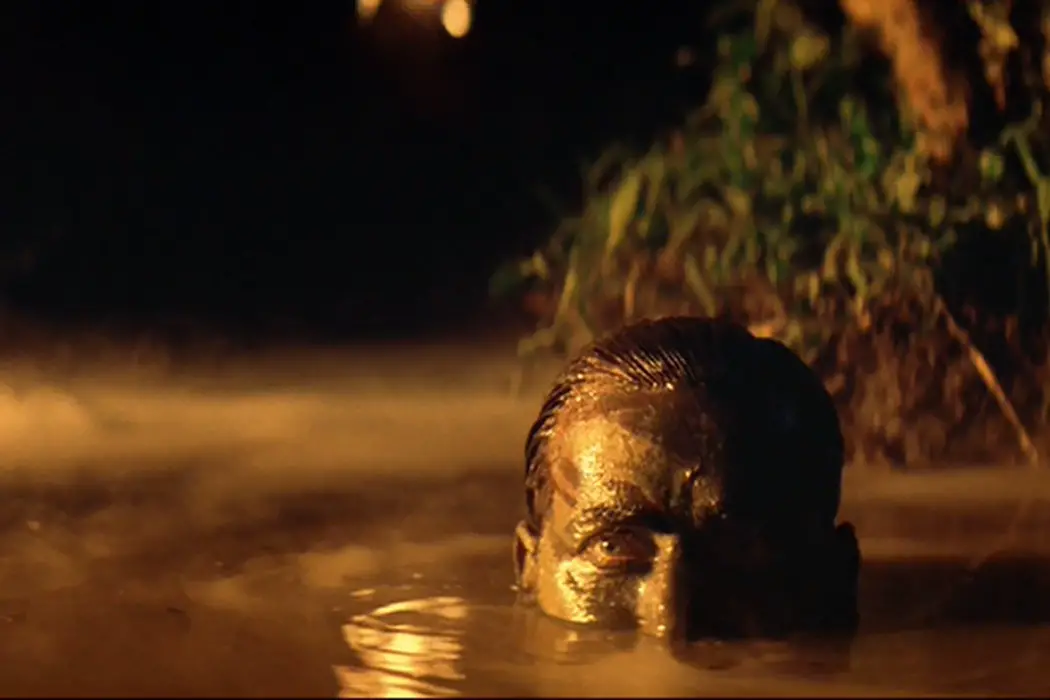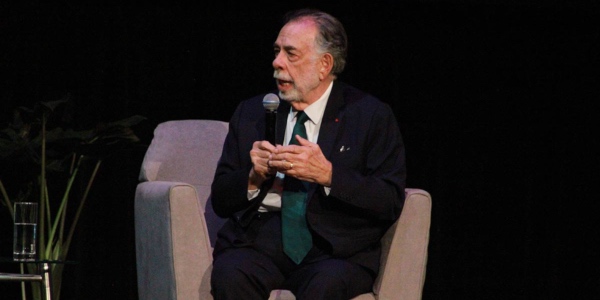Tribeca 2019: APOCALYPSE NOW 40th Anniversary With Francis Ford Coppola

Stephanie Archer is 39 year old film fanatic living in…
There is nothing as inspiring as the continual drive and obsession of an artist. And no one encompasses this more in cinematic history than Francis Ford Coppola. His film, Apocalypse Now, was the movie no one wanted to make. Determination and willpower fueled the film on its course to land in cinemas despite the tumultuous ride. As a result, the director has spent 40 years finding true satisfaction with the project.
I must admit that I am a shameful cinephile in that, up until this evening, I had never seen Apocalypse Now. I know, I know, cue the Cersei “Shame.” While not a film unbeknownst throughout media, this was one that continually slipped by. My interest began to tip into the “must see NOW” category this past fall after some of my reading brought me to a book on cinematic disaster (both financial and otherwise), as well as a book written by Roger Ebert chronicling his time at the 1979 Cannes Film Festival.
When the announcements for the anniversary events were released for this year’s Tribeca Film Festival, it was a serendipitous moment. The Apocalypse Now 40th Anniversary instantly became my most anticipated event of the year.
Apocalypse Now Final Cut
As mentioned earlier, I have had this on my list of “Must See Films” for quite some time, and when the Tribeca Film Festival offered the chance to see it, coupled with a Q & A afterward, I could not pass up on the opportunity. There was an excitement in the air, a flutter of energy as people filed into the theater. I had been to a few of these anniversary screenings before, but there was something different about this one, a different kind of anticipation surrounding the event.

Following a brief introduction to the film, Francis Ford Coppola was invited to come on stage and give his own introduction as well. He lamented on the filmmaking process when he first began, and the process that has followed him throughout his career. This was a film he was just never 100% satisfied with. Tonight, as he announced to the audience, was the premiere of his latest edit and release of the film, Apocalypse Now Final Cut. While he had felt the first one was too short, and the second (Apocalypse Now Redux) was too long, this was just right.
There was a calm as he spoke, yet an excitement that reverberated from him to the audience. He was excited to once again showcase his film, excited to showcase, literally, a life’s work. Here, he proves to the audience that an artist’s work is never done until they say it is. Accompanied briefly on stage by his good friend Robert Duvall, the audience was welcomed back into the jungle. As he left the stage, the enthusiasm did not wane as the film began.
When the film ended, honestly all I could say was “Wow!” While many within the audience were reminiscing about a film they had already seen, I was taking in the classic for the first time. There was not a shred of doubt as to why this film was so culturally infused in film and media. The cinematic accomplishments that were displayed onscreen were mind-blowing. Add in emotions and reactions from the audience, and watching Apocalypse Now Final Cut was an experience I will not soon forget.
The crowd cheered and clapped as Robert Duvall recited “I love napalm in the morning”, as helicopters went blaring past, followed by a hush that fell over the audience as the boat carrying our small band of warriors blindly navigated through the fog. It was crazy too, seeing many actors I discovered in my teens, performing on screen, their younger selves bringing back a different time.
One of the standout moments was watching Marlon Brando manipulating the light on his face, playing with the contrast between the brightness and the shadows. The close-up on him as he flirts with the light is a cinematic moment that has been ingrained in my mind, another example of talent as an actor.

When the film had ended, I instantly had the need and want to rewatch it again. There was so much packed into the film, one viewing is definitely not enough to take in every element it has to offer. Thankfully, the night was far from over, and the next mind-blowing part of the evening was about to begin.
Steven Soderbergh Interviews Francis Ford Coppola
Following the conclusion of the film, Francis Ford Coppola, and mediator Steven Soderbergh, were welcomed to the stage to thunderous applause. There was such an anticipation in the air, which quickly switched to a hushed to silence the moment the interview started. You could tell no one in the audience wanted to miss a word spoken by one of cinema’s directorial legends.
“Everybody thought Apocalypse Now was a bad idea,” was a growing theme at the beginning of the film’s production, and also during the evening’s conversations. No one had made a film about the Vietnam War at this time; and the direction and vision for the film was such a drastic change from The Godfather, no one was convinced this was a film that could be made. Coppola relayed to the audience that he had to put the money up himself for the film to really get started.
“The Godfather was very formal and classical, the styles of my movies were very, very, different,” he said. “So, basically, nobody wanted to do Apocalypse Now, no actors wanted to go to the Philippines, and I was very confused about the situation. Ultimately, the deal I did had to guarantee a budget, and I used the money I had earned with The Godfather, so in truth, what happened was that the movie was so uncertain”.

At the time of the premiere at Cannes, the film was already being heralded a disaster by the media, the original $12 million budget set by Paramount Pictures inflated to $30 million – never mind the amount of footage that had needed to be gone through and edited. With his money on the line, as well as the studios, fear for bankruptcy and failure lurked around every corner.
“My thinking was ‘Oh, we’re never going to be able to survive this’,” he said. “Interest rates in those days, you couldn’t imagine it today, it was over 26%, and I think I owed about $30 million. I didn’t have that kind of money at all, and I was just scared. I had three kids and a family.”
The disasters that befell the film and its crew have been chronicled at length through numerous books and analytical pieces. The film faced hardships from day one, and completing the film was a battle all its own. One of his main actors needed to be fired, a typhoon wiped out sets, Martin Sheen suffered a “very serious” heart attack and Marlon Brando showed up to set overweight, uncooperative, argumentative and just acting like “a big kid,” delaying filming for five days. He was contracted for $1 million a week!
“He was a wonderful man. In my lifetime, I got to meet a dozen geniuses and extraordinary people, but Brando, what he talked about was fascinating. His perspective on life was interesting,” he said. “But he was basically assuming that I was going to go over five weeks, which means I was going to owe him $2 million. And so finally after the fifth day, we hadn’t shot anything, and I only had two weeks left with him.
As the conversation concluded, Francis Ford Coppola looked back at the last 40 years, not with just relief, but gratitude. With an inspirational outlook at his 40-year-long journey, he said,” The point is that in filmmaking, extraordinary things happen to you and it’s up to you to make it positive because in this there is no hell; this is heaven, so make it heaven. It’s up to you. Terrible things happen and we had heart, and it’s really heart that gets you through these situations.”
Does content like this matter to you?
Become a Member and support film journalism. Unlock access to all of Film Inquiry`s great articles. Join a community of like-minded readers who are passionate about cinema - get access to our private members Network, give back to independent filmmakers, and more.













